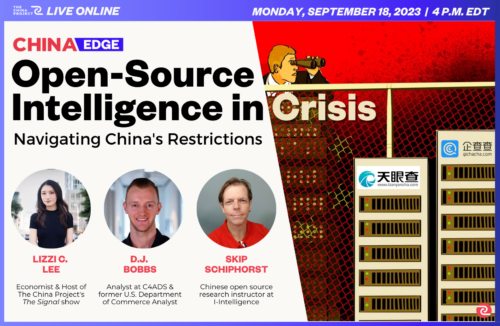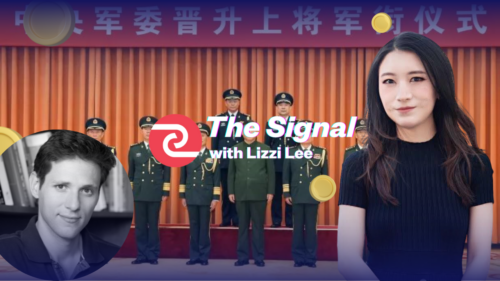‘Backfire: How Sanctions Reshape the World Against U.S. Interests’ | The Signal with Lizzi Lee
In this week's episode of The Signal, Lizzi Lee speaks with Agathe Demarais, author of the book "Backfire: How Sanctions Reshape the World Against U.S. Interests." She shares her thoughts on U.S. sanctions and how they fuel diplomatic disputes between the U.S. and its allies.

Below is a transcript of the video:
Lizzi Lee: Hello and welcome to this episode of Live with Lizzi Lee powered by The China Project. I’m your host, Lizzi. Joining me today is Agathe Demarais, author of the book Backfire: How Sanctions Reshape the World Against U.S. Interests. Thank you so much for joining me today.
Agathe Demarais: Thank you so much for your invitation.
Lizzi: So I just wanted to start with your book. I wonder if you can provide us with an overview of the history and development of sanctions. How did the sanction mechanism come into existence and why has the United States increasingly relied on sanctions to punish violators or perceived violators?
Agathe: This is a great scene-setting question. I would say the U.S. has been using sanctions for a long time. I think that the first instance of U.S. sanctions was against Cuba in 1960 when the U.S. imposed an embargo against the island. But since then, the U.S. has really refined this tool. And no, the U.S. doesn’t really use trade blockade anymore, such as the one that was imposed against Cuba. Now sanctions rely on what is called financial sanctions. That is to say that it is up to banks to control transactions that they process, to say whether they comply or not with U.S. sanctions. And so since Cuba, we’ve seen the U.S. increasingly use sanctions. We’ve seen them being imposed against North Korea, for instance, and then Iran in the year 2000 up to the conclusion of the nuclear deal, and then Venezuela and now against Russia of course.
About the second part of your question, why are sanctions so popular? While sanctions fell between empty diplomatic declarations on the one hand, which are not going to impress anyone and deadly military interventions on the other end. They’re cheap. They don’t cost a penny to the U.S. and they’re very fast to implement. And that all makes them a very popular tool for American policymakers.
Lizzi: I see. So your book also talks about evidence regarding the effectiveness of sanctions. Can you briefly summarize your main takeaway message? In what circumstances do sanctions tend to be more effective?
Agathe: There are five criteria that can make it possible to try to predict the effectiveness of sanctions. But I should say here that it is very difficult to actually say whether sanctions have worked or not with certainty because we don’t have the counterfactual. For instance, when first sanctions were imposed against Russia in 2014, after Russia annexed Crimea and started to back separatist rebels in the Donbass region of eastern Ukraine, well, sanctions were imposed, but we don’t know exactly whether Putin would have invaded Ukraine if sanctions had not been in place. So very difficult because we don’t have the counterfactual. That being said, there are five criteria that we can use to try to predict if sanctions are going to be effective, looking at history. The first one is that sanctions must target an economic partner. That makes perfect sense, of course, because if you target economic ties, if you don’t have any ties, then sanctions are not going to work very well. The second thing is that sanctions tend to have an impact very fast when they work. That being said, we should put a caveat here. Because of the Russia case. Russia is a big economy. So Russia has much more resources and reserves than smaller economies. So this criteria may not apply to Russia today. Another criteria that is very important is that sanctions must have a clear objective. It is extremely important that the target country knows what it has to do for sanctions to be lifted. That is extremely important.
And then you have two more criteria. Sanctions tend to work best when they are imposed against countries where the population has a say in governance, because you want the population to be able to voice its displeasure with the consequences of sanctions. This is what happened in Iran in 2015 before the conclusion of the Iran nuclear deal. And finally, the fifth criteria and that’s a big topic for my book, is that sanctions that the U.S. imposes with a coalition of allies, that is to say the European Union very often tend to work much better than U.S. unilateral sanctions.
Lizzi: Fantastic. The title of your book is kind of a give away. It’s called Backfire. I wonder if you can tell us a little more about that concept. Why do sanctions usually or often fail to achieve their intended goals?
Agathe: Well, it is clear that in some cases sanctions failed to achieve their intended goals. And I argue in the book that U.S. unilateral sanctions tend to fuel disputes, diplomatic disputes between the US and its allies. For instance, I discuss in the book the case of the Nord Stream 2 pipeline where the U.S. had imposed unilateral sanctions to try to derail the construction of this project, and these sanctions had fueled tensions between the U.S. and the EU, which from my perspective, are detrimental to both American and European interests. So that’s the first case.
Another thing is that in some cases U.S. unilateral sanctions and in particular secondary sanctions have fueled transatlantic disputes between the U.S. and its allies.That was the case after the U.S. exited the nuclear deal in 2018. At the time, European companies wanted to stay in the Iranian market, but they couldn’t because of American sanctions.And again, I think this is detrimental to diplomatic relations, which are extremely important between the U.S. and Europe.
So that’s the first thing when we take a look at unilateral sanctions. I very much prefer sanctions builds with a coalition of allies, as is the case against Russia, for instance, today. And the second reason why I used the word backfire is that we are seeing increasingly that a number of targeted countries are building financial mechanisms to try to vaccinate themselves against sanctions. This is not entirely due to sanctions. I think it was always to be expected that emerging countries would want to have their own financial channels. But I would believe that the overuse of sanctions, which have become extremely popular for the U.S., would fuel this phenomenon. And from my perspective, it is a dangerous trend because in a few years sanctions could well become ineffective and that would deprive American policymakers from a very important tool.
Lizzi: As you mentioned, the Western Alliance has imposed severe sanctions on Putin’s war machines since his invasion of Ukraine early 2022. Do you believe the effectiveness or the ineffectiveness of these sanctions support the arguments presented in your book? How would you evaluate the effectiveness of Western alliance sanctions against Russia?
Agathe: I think that actually these sanctions are a perfect example of sanctions going right and being done right. If we go back to the criteria of sanctions being effective, we see that these sanctions need to be imposed by a coalition of allies. And that has been the case. The U.S., the European Union, and other countries such as Japan or Australia, are imposing sanctions against Russia to evaluate the effectiveness of sanctions against Russia. I think it is important to take a look at the goals of these sanctions, and I would say there were three goals and when we assessed sanctions against these goals, it is clear that they are working. The first goal was to send a diplomatic message of resolve and unity to both Ukraine and Russia. And I think from that perspective, mission accomplished. I don’t think that Vladimir Putin was expecting such stringent sanctions to be applied against Russia.
The second goal is about making it more difficult for Russia to wage war against Ukraine, both from a financial perspective and a technological perspective. From the financial perspective, well, it is working. We’re seeing that the G-7 oil price cap is restricting Russia’s oil revenues. And we’re seeing also that the Russian economy posted a recession last year and will probably post a recession again this year. So from the financial perspective, it’s working. And from the technological perspective, it’s also working because sanctions make it more difficult for Russia to access high technology goods from Western countries. And that will make it more difficult for the Russian military to build equipment. And finally, the third goal is about a slow asphyxiation of the Russian energy sector. And this is all due to technological sanctions again, because U.S. sanctions make it very difficult for Russia to access oil and gas drilling technology. This is a problem for Russia because a number of Russian energy fields are coming to maturity. The reserves are being depleted. Russia needs to build new oil and gas fields, especially in the Arctic. But without access to American technology, that won’t be possible. And actually, data from the International Energy Agency confirmed that Russia may lose its status as a global energy superpower in the coming years. At the moment, 30% of globally traded oil and gas comes from Russia, but this share could fall to 15% by 2030. So, yes, sanctions on Russia are working.






